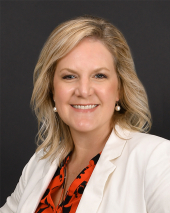As 17-year-old Alexis from Pearland held her phone one night in January by its corner, it accidentally popped out of its case, hitting her squarely between her eyes.
“We didn’t think much of it and thought she would probably be OK,” said Alexis’ mother, Natalie. “But the next day, she woke up with a severe headache, was nauseated, and could only stay awake in very short spurts, so I decided to call the pediatrician.”
Alexis’s symptoms were similar to the ones she experienced less than six months earlier when she hit her head on the metal side of a horse trailer and blacked out. She had suffered a concussion then and was suffering from one now.
Because of COVID-19, students were transitioned to entirely computer-based learning environments, whether virtual or in person. Almost all communication, lectures, and homework were done entirely through a computer. As a result of increased screen time, carrying a heavy academic workload between Advanced Placement (AP) classes at a Pearland high school and associate degree classes at Alvin Community College (ACC) became increasingly challenging for Alexis.
“She went from getting great grades to severely struggling,” said Natalie. “She just couldn’t keep up.”
At her worst, Alexis had various symptoms ranging from migraines and balance issues to being dizzy and nauseous. The cumulative result of symptoms, combined with the impact on her school after years of hard work to be in the top of her class, took an enormous toll on Alexis and her family.
Natalie was referred to Summer Ott, PsyD, neuropsychologist with UT Physicians. Eager to help Alexis manage her schoolwork better, she made an appointment for her daughter.

“Anyone spending long periods in front of the computer should make some adjustments to avoid eye and mental fatigue,” said Ott, who is also an associate professor in the Department of Orthopedic Surgery at McGovern Medical School at UTHealth. “Given the fact Alexis had experienced not one, but two concussions within six months of each other and was now trying to complete her coursework virtually, it was time to make some modifications.”
Ott wrote several letters to school administrators advocating for them to reduce Alexis’s course load. She also suggested several steps that schools could take to make learning in a virtual environment more conducive to students recovering from concussions. Specifically, Ott recommended:
- Using a laptop or computer screen instead of a smartphone. (The screen on the phone is too small and causes eye strain and mental fatigue.)
- Adjusting the computer display to increase the font size to large print (16 to 18 point bold type), enlarging the entire screen, dimming screen brightness, encouraging different screen colors, and contrasting desktop screens from light to dark.
- Offering blue light-blocking glasses to help reduce eye fatigue.
- Reducing screen glare by sitting away from windows and bright lights.
- Offering text-to-speech or voice record lectures for students who find reading too taxing.
- Taking short “eye breaks” from the computer screen.
- Scheduling longer “brain breaks” from the computer throughout the day.
Ott took a multidisciplinary approach to Alexis’s care. She went beyond writing letters to school leaders and also recommended Alexis receive vestibular therapy (VRT). VRT is a specialized form of treatment that addresses issues of vertigo, dizziness, and imbalance. Alexis was also referred to a headache specialist, who administered steroid injections and numbing agents in the back of her head to relieve any nerve inflammation.
“This particular case emphasizes the increasing need among students to stand up for themselves when their learning environments aren’t favorable as a result of a concussion sustained either on or off the field,” said Ott. “There is plenty of legislation out there supporting when kids should return to athletics after injury; the same type of legislation should be considered for students for returning to learning post-concussion.”
Natalie said parents going through similar situations should know that implementing concussion protocols were initially challenging.
“Most teachers were very reluctant to make any changes with the exception of Alexis’ AP physics teacher, who seemed to be one of the only teachers initially to understand the severity of her symptoms and the consequences due to the lack of accommodations,” she said. “Dr. Ott’s letters provided the means for Alexis and her parents to work directly with schoolteachers and administration to identify a path forward while keeping Alexis on the accelerated track she was on already. College classes, in particular, relied on utilizing Dr. Ott’s letter to eventually obtain help through the ACC Disability Center.”
The adjustments made to her learning environment, paired with the injections and VRT, have made a difference for Alexis. Her symptoms have decreased and her balance is back to where it should be. A junior in high school and competitive equestrian, she’s setting her sites to attend Texas A&M University and enroll in the vet program.
Ott says Alexis’s prognosis is a positive one. She expects her to turn a corner this summer, so she can fully reengage in all of her academic and other activities next year.
“Dr. Ott has been fantastic in helping us navigate this journey with Alexis. I would highly recommend her to any parent going through a similar diagnosis with their child,” said Alexis’ mother. “I hope that sharing our story will shine a light on concussions and how they impact academic performance, especially when students are learning in virtual environments.”



